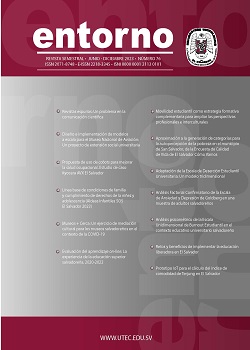Confirmatory Factor Analysis of the Goldberg Anxiety and Depression Scale in a Sample of Salvadoran Adults
Published 2024-06-18
Keywords
- Psychometry,
- Psychological tests – Adults,
- Life behavior – Adult,
- Stress (psychology) – Research,
- Performance anxiety
- Panic disorders,
- Adulthood – El Salvador – Social aspects ...More
Copyright (c) 2023 Universidad Tecnológica de El Salvador

This work is licensed under a Creative Commons Attribution-NonCommercial-ShareAlike 4.0 International License.
How to Cite
Abstract
Anxiety and depression are two of the mental health disorders that have had the greatest impact on the life of human beings in recent decades mainly because they are two of the conditions that have interested scientists and people the most. This article is the extension of a previous study about the psychometric properties of the Goldberg Anxiety and Depression Scale (GADS) in the Salvadoran context, with the objective of verifying if the GADS has adequate validity indexes based on the Confirmatory Factor Analysis. The study is instrumental with a cross-sectional design. Data was collected using the digital survey technique, through the Google Forms tool. Convenience sampling was used, surveying a total of 487 Salvadoran adults. The sample consisted of 279 women (57,1 %), 207 men (42,3 %) and three non-binary people (0,6 %). The total mean age was 27.81 years with a standard deviation (SD) of 5.67. Based on gender, the mean age for women was 27.48 years (SD = 5.43) for men, the GADS has adequate confirmatory validity and reliability. It is concluded that the GADS is an instrument with adequate psychometric properties to be used in the Salvadoran context.

